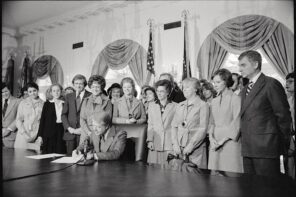As RD shuts the lights for the holiday weekend, all signs suggest that Americans will have more to worry about this Labor Day than how and where to store their white spats for the coming months.
The most recent Department of Labor report revealed that no new jobs were added in the month of August, leaving the unemployment rate at 9.1%, just as a new poll shows that confidence in labor unions is at an all-time low. President Obama and the Republican presidential candidates are busy crafting their jobs plans, most likely without regard to the religious left, whose failure to influence the debt ceiling debate has made room for others to question the current strategy and rigid conceptions of theology.
Below, Peter Laarman examines and critiques some of the existing efforts to address the spiritual fallout from the jobs crisis, and offers a theory of his own for religious leaders interested in addressing it in their congregations and beyond. —eds.
Diane (not her real name) is deeply ashamed and deeply frustrated. She is someone who “did everything right,” but now she doesn’t have steady work and almost can’t bear to meet with her employed friends. Eric fell down a well of isolation so deep that his marriage was all but broken. Jim feels a coruscating rage toward today’s employers who refuse to meet job applicants in person and who automatically disqualify those who aren’t currently working or whose credit reports are less than great. Cheryl was finally able to get a job after a year (albeit at a lower rank and pay than before); she still comes to her group because she’s devoted to the people she met there.
I had the privilege of meeting these people through “Life and Livelihood,” a small group process I helped to initiate at the church I attend. Gatherings don’t simply supply pastoral support for the unemployed and underemployed; nor are they simply resume-writing “reinvention” groups; nor is the process mainly about vocational discernment or organizing for change. Although participants can and do get all of these things, the group’s most valuable gift is the direct connection to others who also experience humiliating rejection, acute anxiety, and growing bitterness as the Great Recession grinds on (and on).
Donna Schaper wrote recently in these pages about debt as a spiritual matter. Her aperçu goes triple for work (something we human beings do all the time, whether or not we are paid for it). Herr Doktor Freud taught us well: human thriving is all about love and work. Coming to appreciate that we are not defined by what we do for money—but that we also have a right to be incensed about what’s become of paid employment in America—is important spiritual work. Four years into the acute job crisis, for example, it’s long past time for the emergence of something like the new Faith Advocates for Jobs network.
Freedom from the Experience of Humiliation? It’s a Bit More Complicated
There is a growing current in religious thought that emphasizes the potential for liberation in finding that life goes on when a job comes to an end—or when any other significant personal catastrophe occurs. Richard Rohr’s well-received Falling Upward falls broadly into this category. Rohr writes that in order for someone to break free into deeper wisdom and deeper spirituality, “a job, fortune, or reputation has to be lost, a death has to be suffered, a house has to be flooded, or a disease has to be endured.”
I can see how it’s possible, eventually, for an individual to receive job loss as a gift. But no sane religious leader would open a conversation with desperate jobless people in anything remotely like an Aren’t you lucky? mode. Some people may eventually discover a new kind of life-giving humility in the wake of a life-destroying humiliation, but that passage cannot be assumed or forced. There is also something profoundly wrong about pressing people to “move on” and simply adapt themselves to the brutality and meanness of employer behavior—or to the callousness of politicians who mouth concern for the jobless while saving all of their real love for their buddies in the rentier class. Having one’s job “terminated” is very different from being struck by disease or death or natural disaster; religious leaders ought to respect the difference and not press a course of quiescence or acceptance in the face of blatant injustice.
Word: A sanctified space for people struggling with work-related issues should not be just one thing and should not operate in just one mode. It can and should be a big container for the full range of responses: for grieving, for anger, for personal rebirth, for shared discovery, for new enterprise creation, for political consciousness-raising, and for collective justice action.
But most of all for community. With very few exceptions, the people who slowly filled the room at 7 a.m. for the very first Pasadena group didn’t know each other. There was a former senior executive and a construction worker, an architect and an actor, writers and teachers, HR professionals and food service managers. After the 75-minute facilitated portion I told them that the meeting space was theirs to use as long as they wanted. They stayed and talked through the entire morning; they spun out ideas about how they could scale up the reach and effectiveness of “Life and Livelihood”; and they continued to give each other the essential daily bread of friendship and solidarity.
Exposing the Culture of Lies—and Exposing What We Desire Most
None of this should be surprising. We’ve been here before, during the Great Depression, when the worst of all hard times brought out the best in many Americans. To the point that, years later, many old-timers could recall those days as both unimaginably horrible and unimaginably wonderful. Re-read Studs Terkel’s Hard Times if you doubt it.
’Buked and scorned for centuries by white oppressors, African Americans built for themselves a rich religious and ethical culture filled with tenderness and respect for personhood. Someone’s crying, Lord, come by here! Black folk would sometimes have to tell their white would-be saviors “Don’t ever say that we’ve got nothing. We’ve got us!”
I have a theory about what might begin to unfold if more religious leaders would step up to create sanctified spaces for real conversations about the New Normal. First, everything that is false and trumped up about our culture and our politics will stand fully exposed—including the lies and myths we tell ourselves about what it means to be “successful” and about the Pageant of Democracy put on by the plutocratic state.
Second, the people entering these sacred spaces will find themselves personally exposed in respect to what they really desire (which is another way of saying that the God dwelling in them will become a bit more active and a bit more vocal).
The godly desires thus exposed will turn out to be pretty basic. People desire companionship and a sense of shared enterprise, first of all. They desire a whole lot more truth-telling than is usually available in the public culture. They desire concrete ways of showing solidarity with others who likewise experience employer abuse and humiliation. They crave a chance to organize and to voice public outrage over the trashing of what little remains of the social contract in the United States.
And I almost forgot to say that religion, in the sense of conventional piety, doesn’t and shouldn’t even enter into it. There’s no real need for any kind of God talk in this context—and small group participants will be disturbed and offended if a sponsoring church tries to exploit their vulnerability for its own ulterior purposes. The meeting space will be sanctified not by anyone’s particularist prayer but simply by the glory of God that is revealed when human beings come fully alive in an atmosphere that respects and welcomes them. I believe it’s called reverence.




